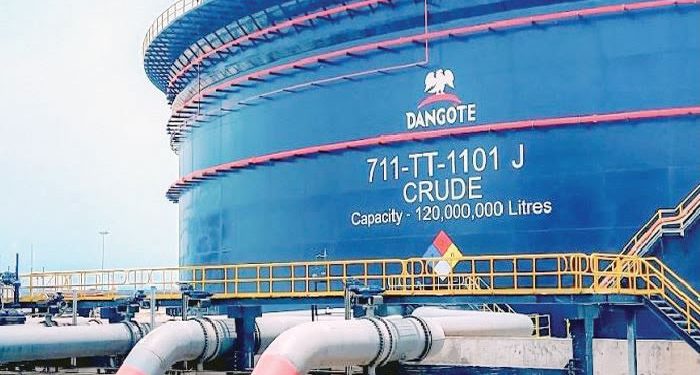In another bold move that reflects its growing influence in Nigeria’s downstream oil sector, Dangote Petroleum Refinery has announced a fresh reduction in the gantry price of Premium Motor Spirit (PMS), commonly known as petrol. The new price, now pegged at N835 per litre, represents a 3.5 percent cut from the previous rate of N865 per litre. This latest adjustment comes on the heels of a decline in global crude oil prices, which have dropped to $64 per barrel, down from over $70 in recent weeks.
The refinery had earlier revised its gantry price from N880 to N865 per litre as part of its efforts to reflect changing market realities and ease the cost of fuel for distributors and, ultimately, end users. However, that previous reduction was not fully felt by consumers, as many oil marketers failed to translate the savings into lower pump prices. This latest adjustment, however, could serve as a fresh opportunity for marketers to rethink their pricing models and offer some relief to motorists and other fuel users.
Industry observers believe that the Dangote Refinery’s decision to reduce petrol prices for the second time in a short period sends a strong signal of its intent to drive change in Nigeria’s fuel supply chain. The refinery, which has a massive daily processing capacity of 650,000 barrels, has positioned itself as a key player capable of not just refining crude oil at scale but also influencing pricing patterns within the local market.
The drop in global crude oil prices has been attributed to several factors, including increased production from non-OPEC countries, reduced demand projections from major economies, and ongoing geopolitical tensions affecting energy markets. As crude prices continue to fluctuate, local refiners like Dangote are expected to adjust their pricing accordingly to stay competitive and responsive to market trends.
With Nigeria still grappling with fuel distribution inefficiencies, pricing concerns, and the lingering effects of subsidy removal, the Dangote Refinery’s role has become even more critical. Its pricing strategy could play a part in moderating fuel prices across the country, especially if oil marketers align with the refinery’s efforts by ensuring that price cuts at the gantry level are reflected at filling stations.
In the broader context of Nigeria’s energy landscape, the Dangote Refinery represents a shift towards greater self-sufficiency in petroleum refining. Since its commissioning, it has gradually ramped up operations and entered the domestic market with refined products, aiming to reduce Nigeria’s reliance on fuel imports and stabilize prices over time.
While the refinery’s price adjustment offers a glimmer of hope for consumers, much will depend on how the rest of the supply chain responds. For the impact to be fully felt at the pump, marketers must collaborate with the refinery’s price reforms and avoid practices that negate potential consumer benefits.
As stakeholders continue to monitor developments, the recent price cut not only underscores Dangote Refinery’s responsiveness to global market changes but also its potential to shape a more competitive and transparent fuel pricing environment in Nigeria and, possibly, the wider West African region.










